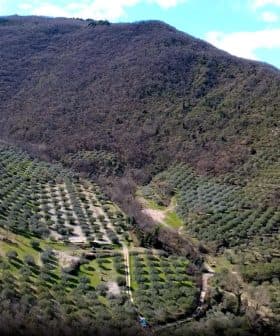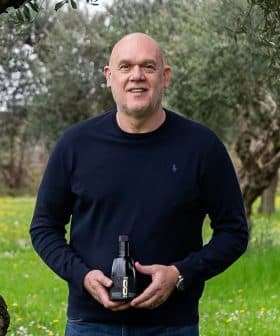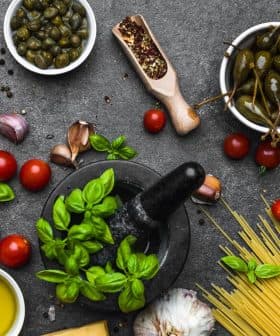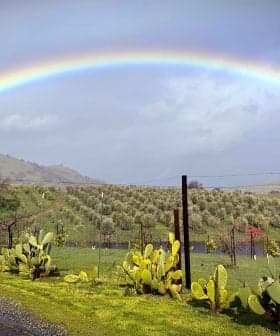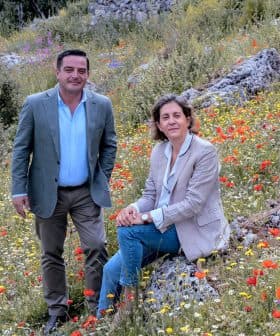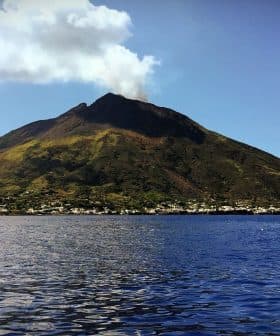Rare Italian Olive Variety Leads to World Class Oil
The producer behind Biagioli Farm celebrated a Gold Award at the 2025 NYIOOC for a Coroncina monovarietal, native to Italy’s Marche region.
 Biagioli Farm occupies a single hectare nestled in the mountains of the Marche region. (Photo: Biagioli Farm)
Biagioli Farm occupies a single hectare nestled in the mountains of the Marche region. (Photo: Biagioli Farm) Giancarlo Biagioli’s Coroncina olive oil won a Gold Award at the 2025 NYIOOC World Olive Oil Competition, marking the variety’s debut on the world stage. Biagioli’s dedication to preserving the unique qualities of the Coroncina cultivar through traditional farming practices and careful processing has garnered international attention and acclaim.
Historically cultivated in a few square kilometers in central-southern Italy, the Coroncina olive variety was thrust onto the world stage at the 2025 NYIOOC World Olive Oil Competition.
A Coroncina monovarietal extra virgin olive oil milled from 65 ancient olive trees spanning a single hectare earned a Gold Awardin its World Competition debut.
There’s still so much to uncover in the quest for excellence. Extra virgin olive oil can bring out something deep, even primordial. I feel ancient echoes when I taste my oil.
“It was our first time,” said Giancarlo Biagioli, an expert taster and owner of Biagioli Farm. “While we already knew that our extra virgin olive oil was good, the Gold Award in New York confirmed that we are doing what it takes to bring Coroncina to the world stage.”
“It’s a very rare cultivar, one of the most unknown even in Italy, and yet it has a strength of its own,” he added. “Our oil convinced the judges also because of these features: a clear aroma, with notes of artichoke and fresh grass, and that uniqueness you can’t find elsewhere.”
See Also:Producer ProfilesAfter years of training and practice as a professional taster, Biagioli enrolled in the early 2000s in the national register of olive oil tasting experts maintained by the Ministry of Agriculture.
“I wanted to understand this cultivar truly. For years, it was harvested too late, at the expense of its aromatic intensity,” Biagioli said. “So I decided to anticipate the harvest to mid-October, right at the beginning of veraison, to respect its soul.”
Nestled in the heart of the Marche region at almost 500 meters above sea level, Biagioli Farm’s new olive grove sits between Caldarola and Serrapetrona.
“Here, the Coroncina tree reigns supreme,” Biagioli said. “It grows on calcareous soil, full of gravel and stones, which makes any agricultural operation difficult. But it is precisely in that harsh terroir that the plant finds its fullest expression.”
The fascinating history of the Coroncina cultivar complements its award-winning flavors.
“I found a municipal ordinance from 1453 that required those who owned small plots of land to plant two-thirds with Coroncina olive trees and one-third with fig trees,” Biagioli recalled. “And they did that for a reason. They believed the figs would attract the olive fruit fly to protect the olives.”
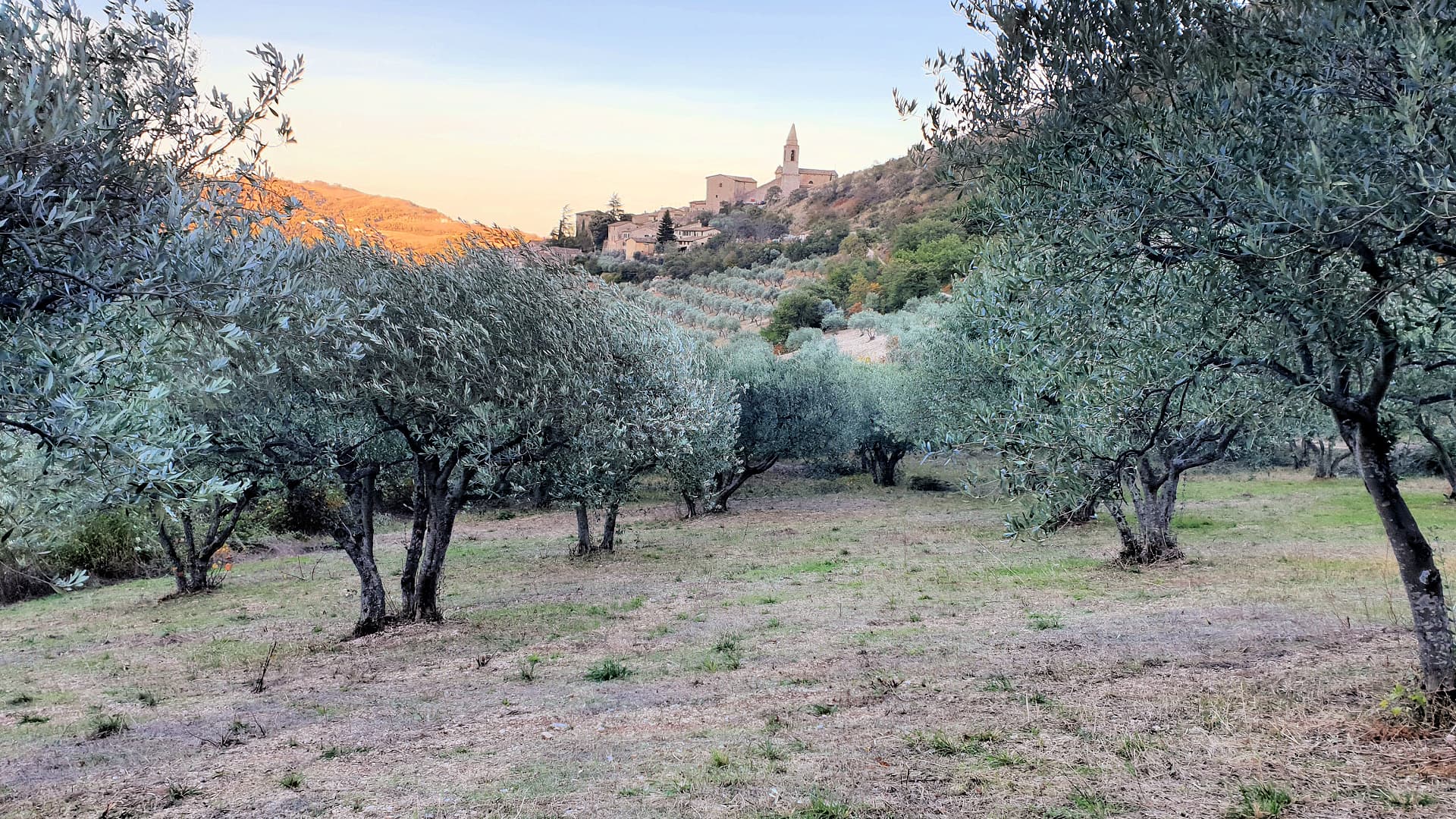
(Photo: Biagioli Farm)
“They show that even in ancient times, people here were already looking for quality olives,” Biagioli said.
Coroncina farmers count on the thick skin of the drupes, which makes it far more difficult for the olive fruit fly to colonize an orchard.
According to Biagioli, the balance between nature and tradition, modern technique and historical memory, defines the quality of his award-winning olive oil.
“I don’t use any chemical treatments. Not even those allowed in organic farming. I had the soil analyzed before starting to ensure no pesticide residues. It’s land that has never seen anything foreign to its natural cycle,” he explained.
The orchard itself required a long wait and a bit of luck. “It took me 15 years to find the right plot. Those who own these olive trees hold on to them tightly. It’s like waiting for a front-row spot at the beach resort. When the owner finally decided to sell, she told me: ‘I’m not giving away my father’s olive grove to just anyone.’”
This is why Biagioli hopes to expand the production area in the coming years, though he is not entirely optimistic about it.
“I’d love to acquire another olive grove, but you have to win the owners’ trust,” he said. “It’s not a matter of money. There’s an almost religious attachment to these trees. They’re not sold to just anyone. I was lucky.”
According to Biagioli, the origins of Coroncina date back many centuries.
“I found references connecting this area to the Basilica of San Clemente a Casauria, in Abruzzo,” Biagioli said. “Around the year 1000, Cistercian monks are believed to have brought some cultivars here to produce oil for sacraments and lighting.”
“Coroncina may be a derivation of Toccolana, an Abruzzese variety with which it shares genetic and sensory traits,” he added. “It’s only a hypothesis, but a fascinating one.”
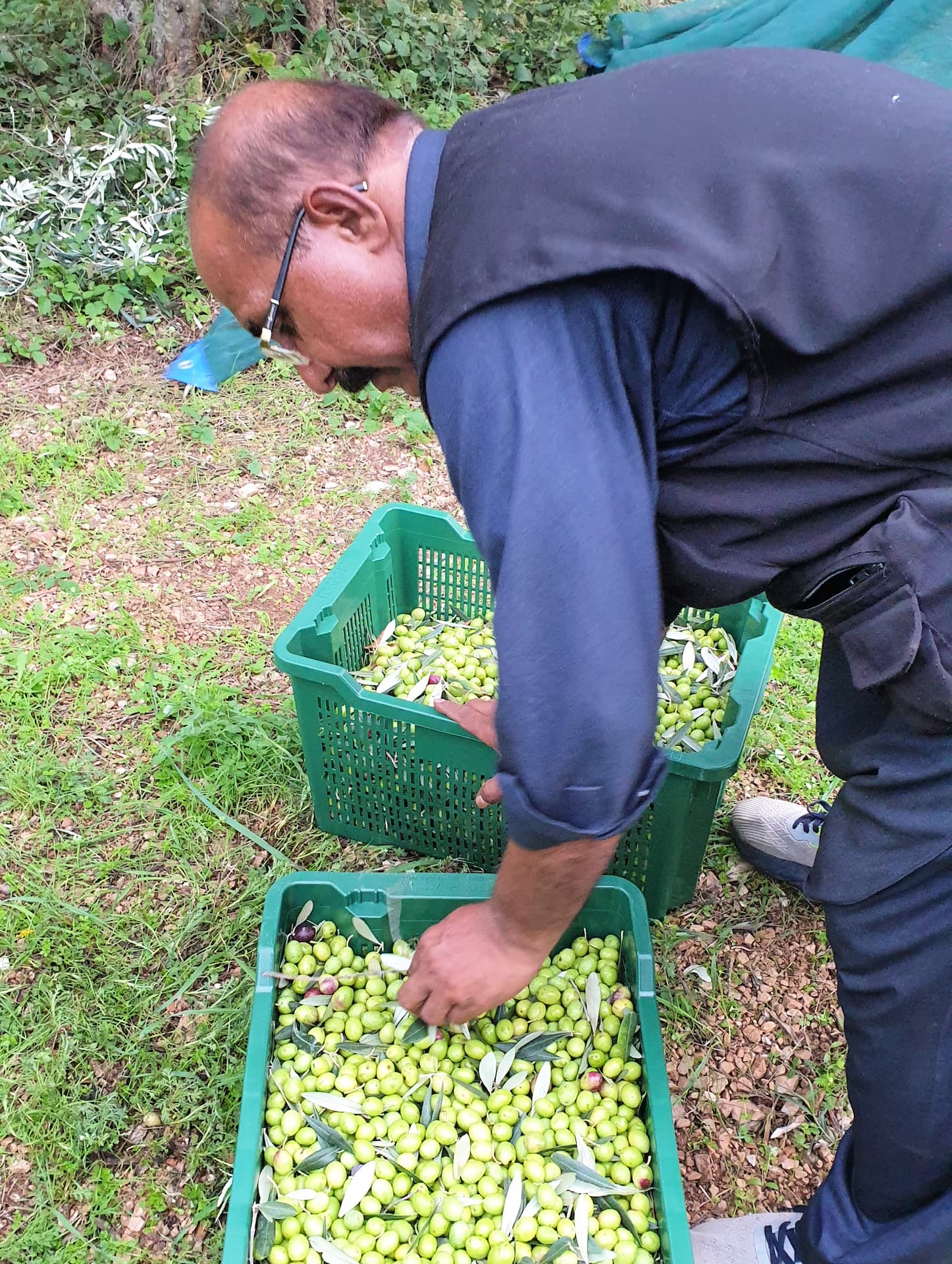
Giancarlo Biagioli waited 15 years before buying his one hectare farm of Coroncina. (Photo: Biagioli Farm)
Once the grove became available, Biagioli decided to introduce a long series of improvements to enhance the rare cultivar’s natural qualities.
“I chose the mill: a new one, equipped with the latest-generation Mori-Tem system, working in the absence of oxygen,” he recalled.
The farm organized the harvest so that all the olives would be collected and transported to the mill within three to four hours.
“I filtered the oil after about 20 days, storing it in stainless steel tanks under nitrogen,” Biagioli said. “Then I bottled everything in small 250 milliliters bottles, ideal for the restaurant industry, so the oil always stays fresh.”
The Coroncina monovarietal is now winning new supporters locally due to the growing interest of several chefs. Having been featured on the world stage, olive oil is also attracting international customers.
“I shipped a few bottles to Norway. I was impressed by the attention Northern Europeans give to olive oil’s quality and health aspects. There, it’s seen not just as an ingredient but as a health ally,” Biagioli noted.
Coroncina seems to lose its soul outside this tiny region, Biagioli believes.
“Taken from here and grown elsewhere, its oil becomes something else. Terroir is everything. Moving it means canceling what makes it unique,” he said.
According to Biagioli, producing olive oil means telling a story.
“There’s still so much to uncover in the quest for excellence. Extra virgin olive oil can bring out something deep, even primordial. I feel ancient echoes when I taste my oil,” he concluded.
Share this article


